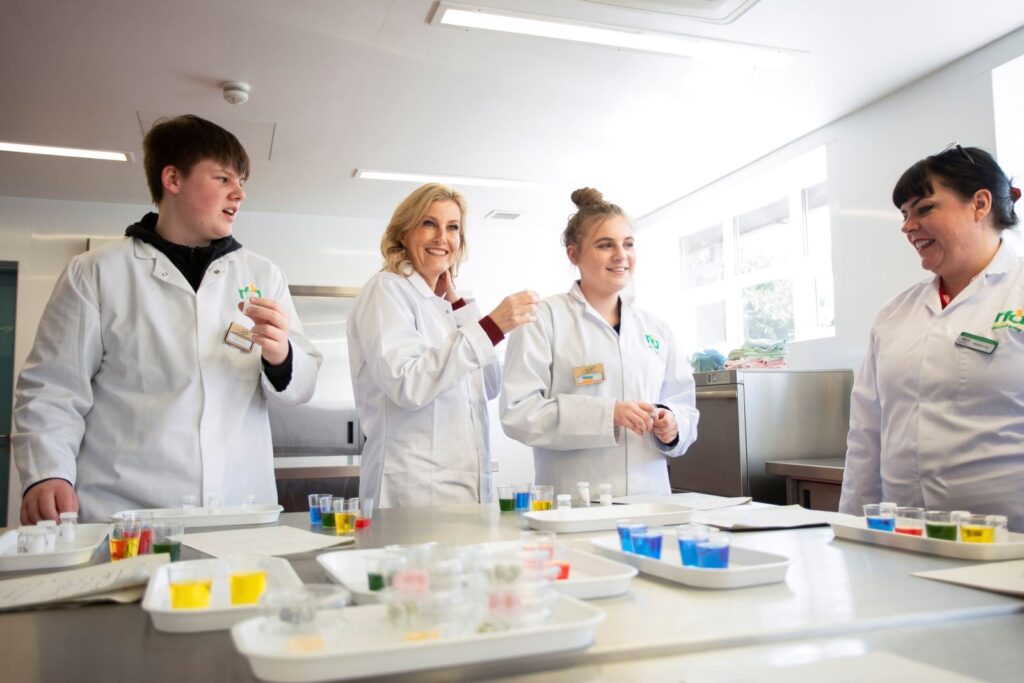LEAF Education research to inspire the next generation of agricultural leaders
15th April 2023
LEAF Education’s latest study of 2,500 young people, conducted in partnership with McDonald’s UK and Harper Adams’ School of Sustainable Food and Farming, demonstrated the agri-food industry is best placed to engage, motivate and inspire 12-19-year-olds about the sector and how to get involved in it.

HRH The Duchess of Edinburgh joined students at Harper Adams University as part of the culmination of the research.
While 66% of young people in the study have not had the chance to learn about the agri-food industry in school, 75% believe that agriculture and food education should form a larger part of the school curriculum.
LEAF Education’s research is an investigation of the extent to which the next generation can be considered ‘conscious consumers’. The results indicate that 80% of participants are keen to learn more about sustainable food choices. Moreover, 65% expect supermarkets and big brands to make those sustainability decisions on their behalf before products hit the shelves.
Another positive outcome of the research was 84% of young people stating that environmental sustainability would be their number one factor, over and above cost or convenience when purchasing food, if correct and clear information was provided.
As part of the culmination of the research, HRH The Duchess of Edinburgh joined students at Harper Adams University, taking part in high-tech agri-food sessions designed to showcase the breadth and depth of our modern agri-food industry and listening to students’ career aspirations and understanding of sustainable food choices.
Commenting on the findings, Beth Hart, vice president of Supply Chain & Brand Trust at McDonald’s UK & Ireland, said: “Our business relies on over 23,000 British and Irish farmers to produce quality ingredients that go into our products, so ensuring a resilient and successful agri-industry is critical for both their futures and securing ours too.
“That is why we’re so passionate about engaging and inspiring the next generation who can bring fresh thinking to the sector, particularly when it comes to sustainability.
“We are committed to supporting LEAF Education to help us achieve this and look forward to working together to ensure these research findings inform how we make a difference,” she added.
The findings from LEAF Education’s latest prove that the majority of young people are hugely positive about the agri-food industry, with 9 in 10 stating that society should be better connected to where food comes from.
91% of young people also believing our individual food choices are important in the fight against climate change, which explains why younger generations are looking to engage with the agri-food industry more than ever.
“A welcoming industry for diverse communities”
Carl Edwards, LEAF director of Education and Public Engagement, commented: “The results of this latest survey will inform our work going forwards and encourage action to be taken by our partners across the agri-food and education industries.
“The majority of teenagers see the agri-food industry as a well-skilled sector, describing it as a resilient, rewarding, fulfilling and well-paid area of work. Very different from perhaps our own misconceptions of what we think young people might suggest, with 76% saying they think an agricultural degree would give them a wide range of transferable skills and broad knowledge of land use and the environment.”
Most young people also have a positive opinion on farmers’ sustainability efforts. Of the 2,500 respondents, 77% believe farmers look after crop health on their farms, while 75% say it’s important that farmers consider the environment. Meanwhile, 89% think UK food producers are more likely to care for the environment than those in other parts of the world.
Almost half of teens in LEAF Education’s research think we should prioritise making healthy food affordable for everyone (47%) and providing more varied diets for our growing population was also seen as important by a third of respondents.
Last but not least, 83% agree that science and innovation will underpin the future of farming, meaning sufficient, high-quality food for all and an environment fit for future generations.
Mr Edwards believes farmers and agriculturalists should strive to understand young people’s changing perceptions of the agri-food industry as a possible workplace.
“Three in five of the teenagers see food and farming as a welcoming industry to new entrants from diverse communities, believing that the food sector especially seeks diverse voices to support with product development, as well as providing more offers and opportunities in supermarkets,” he added.
“The insights in this study are hugely valuable. Not just for future careers in our sector but as future consumers. Teenagers recognise the industry’s importance to their lives, but there’s more to be done to make them informed and conscious consumers of the future.
“Providing practical steps to enter our industry is a clear ask of them, and we need to work together to achieve it,” Mr Edwards concluded.
